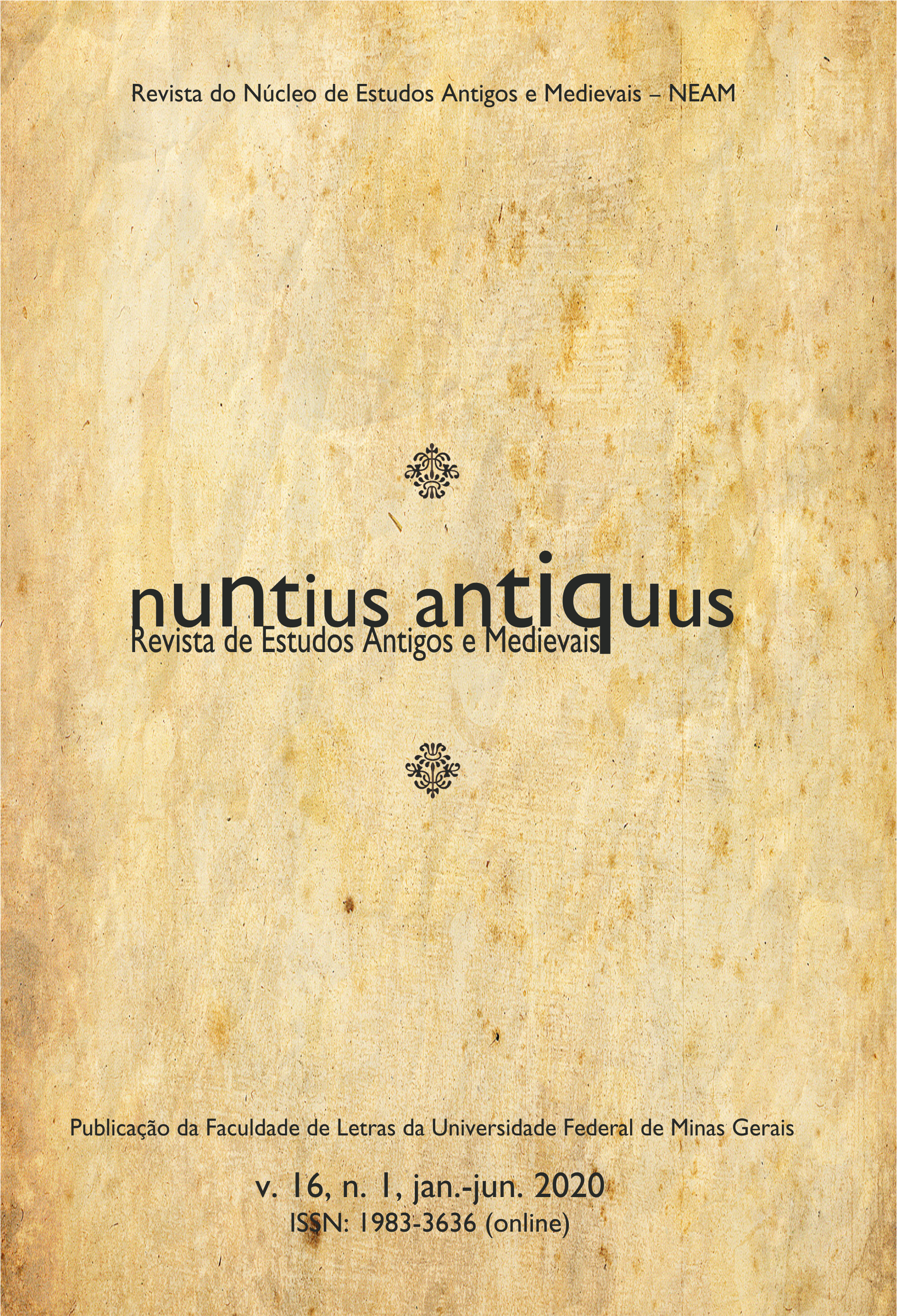Imitation and Emulation of Catullus in the Renaissance
the Basiorum Liber, by Johannes Secundus
DOI:
https://doi.org/10.35699/1983-3636..20393Keywords:
Basia, Kisses, Catullus, Johannes Secundus, intertextuality, allusion, imitation, emulation, Neo-Latin literature, poetical translation, erotic poetryAbstract
This article deals with the imitation and emulation of Catullus at the time of the Renaissance. It uses as an example the work Basiorum Liber (or Basia), a set of nineteen poems on the theme of kissing. This work, which had a great impact on European literature, was composed in Latin by the Dutch humanist Johannes Secundus, in the 1530s. From the analysis of three selected poems, we try to point out the characteristics of Catullus’s style present in the neo-Latin Renaissance poetry, in several aspects, such as its themes, vocabulary, polymetric verses and figures of speech. The three poems were translated into metrical verses, accompanied with notes. We also investigate the allusions made by Secundus to the Catullan text. Furthermore, although not the focus of the article, we examine allusions to other classical poets, such as Propertius, as well as the imitation of Catullus by sixteenth-century French authors, such as Baïf and Ronsard. The article also contains an explanation of some of the translation criteria adopted, such as, on the metric employed.
Downloads
References
ACHCAR, F. Lírica e lugar-comum. São Paulo: Edusp, 1994.
ADAMS, J. N. The Latin Sexual Vocabulary. Londres: Duckworth, 1982.
ALLEN, J. H.; GREENOUGH, J. B. New Latin Grammar. Mineola: Dover Publications, 2006.
CARDOSO, Z. de A. A Literatura Latina. São Paulo: Martins Fontes, 2003.
CATULLUS et alii. Catullus; Tibullus; Pervigilium Veneris. Edited by G. P. Goold. Cambridge: Harvard University Press, 2000. (Loeb Classical Library)
CÉARD, J.; TIN, L. G. Anthologie de la poésie française du XVIe siècle. Paris: Gallimard, 2005.
CECCARELLI, L. Prosodia e metrica latina classica con cenni di metrica greca. Roma: Società Editrice Dante Alighieri, 2018.
CESILA, R. T. Epigrama: Catulo e Marcial. Campinas: Editora Unicamp; Curitiba: Editora UFPR, 2017.
COLEMAN, D. G. The Gallo-Roman muse: aspects of Roman literary tradition in sixteenth-century France. Cambridge: CUP, 2010.
CRUSIUS, F. Iniciación en la métrica latina. Barcelona: Bosch, 1987.
FORD, P. The Basia of Joannes Secundus and Lyon Poetry. In: FORD, P.; JONDORF, G. Intellectual Life in Renaissance Lyon. Proceedings of the Cambridge Lyon Colloquium 14-16 April 1991. Cambridge: Cambridge French Colloquia/CUP, 1993.
GAISSER, J. H. Catullus and his Renaissance readers. Oxford: Clarendon Press, 1993.
GAISSER, J. H. Catullus in the Renaissance. In: SKINNER, M. B. A Companion to Catullus. Oxford: Blackwell Publishing, 2007. p. 439-460. DOI: https://doi.org/10.1002/9780470751565.
JOHNSON, W. R. Neoteric Poetics. In: SKINNER, M. B. A Companion to Catullus. Oxford: Blackwell Publishing, 2007. p. 175-189. DOI: https://doi.org/10.1002/9780470751565.
JONES, P.; SIDWELL, K. Aprendendo latim. São Paulo: Odysseus, 2012.
LAIGNEAU-FONTAINE, S. Introduction. In: BOURBON, N. Nugae-Bagatelles (1533). Genebra: Droz, 2008. p. 9-194.
LAIGNEAU-FONTAINE, S. Introduction. In: DUCHER, G. Épigrammes. Paris : Honoré Champion, 2015. p. 9-140.
LAURENS, P. Anthologie de la poésie lyrique latine de la Renaissance. Paris: Gallimard, 2004.
LAUSBERG, H. Elementos de Retórica Literária. Lisboa: Fundação Calouste Gulbenkian, 1993.
MAROUZEAU, J. Traité de stylistique latine. Paris : Les Belles Lettres, 1946.
OLIVA NETO, J. A. (org.). O livro de Catulo. São Paulo: Edusp, 1996.
OLIVA NETO, J. A. 11 poemas de Propércio (I, 1-11) traduzidos com o verdadeiro dístico elegíaco de Péricles Eugênio da Silva Ramos. Cadernos de Literatura em Tradução, São Paulo, n. 15, p. 151-184, 2015. Disponível em http://www.revistas.usp.br/clt/article/view/114400/112260. Acesso em: 10 abr. 2020.
OLIVA NETO, J. A. Falo no jardim: Priapeia grega, Priapeia latina. Cotia: Ateliê; Campinas: Editora Unicamp, 2006.
OXFORD Latin Dictionary. Edited by P. G. W Glare. Oxford: Clarendon Press, 1996.
PINHO, S. T. A viagem marítima como metáfora da criação literária: o exemplo paradigmático de Aires Barbosa. In: PANTANI, I.; MIRANDA, M.; MANSO, H. (ed.). Aires Barbosa na Cosmopólis Renascentista. Coimbra: Imprensa da Universidade de Coimbra, 2014. Disponível em https://digitalis.uc.pt/pt-pt/livro/viagem_mar%C3%ADtima_como_met%C3%A1fora_da_cria%C3%A7%C3%A3o_liter%C3%A1ria_o_exemplo_paradigm%C3%A1tico_do_humanista_aires. Acesso em: 10 abr. 2020.
PLATNAUER, M. Latin elegiac verse. Hamden: Archon Books, 1971.
PROPÉRCIO, S. Elegias. Edição crítica de Guilherme Gontijo Flores. Belo Horizonte: Autêntica, 2019.
PUTNAM, M. Tibullus: a commentary. Norman: University of Oklahoma Press, 1973.
REYNOLDS, L. D. Scribes and scholars. A guide to the transmission of Greek and Latin literature. Oxford: Clarendon Press, 1991.
RONSARD, P. Œuvres complètes. Édition critique par Paul Laumonier. Société des textes français modernes. Paris : Librairie Marcel Didier, 1967. v. 18.
SACRÉ, D. The Low Countries. In: KNIGHT, S.; TILG, S. The Oxford Handbook of Neo-Latin. Oxford: OUP, 2015. p. 477-492. DOI: https://doi.org/10.1093/oxfordhb/9780199948178.001.0001.
SECOND, J. Œuvres complètes : Basiorum Liber et Odarum Liber. Édition critique par Roland Guillot. Paris: Honoré Champion, 2005. t. I.
SHEETS, G. A. Elements of Style in Catullus. In: SKINNER, M. B. A Companion to Catullus. Oxford: Blackwell Publishing, 2007. p. 190-211. DOI: https://doi.org/10.1002/9780470751565.
SKINNER, M. B. A Companion to Catullus. Oxford: Blackwell Publishing, 2007. DOI: https://doi.org/10.1002/9780470751565.
VASCONCELLOS, P. S. Efeitos intertextuais na Eneida de Virgílio. São Paulo: Humanitas, 2001.
VASCONCELLOS, P. S. O cancioneiro de Lésbia. São Paulo: Hucitec, 1991.
VIRGIL. Aeneid 7-12, Appendix Vergiliana. Translated by H. R. Fairclough. Revised by G. P. Goold. Cambridge: Harvard University Press, 2000. (Loeb Classical Library)
VIRGIL. Eclogues, Georgics, Aeneid 1-6. Translated by H. R. Fairclough. Revised by G. P. Goold. Cambridge: Harvard University Press, 2006. (Loeb Classical Library)










